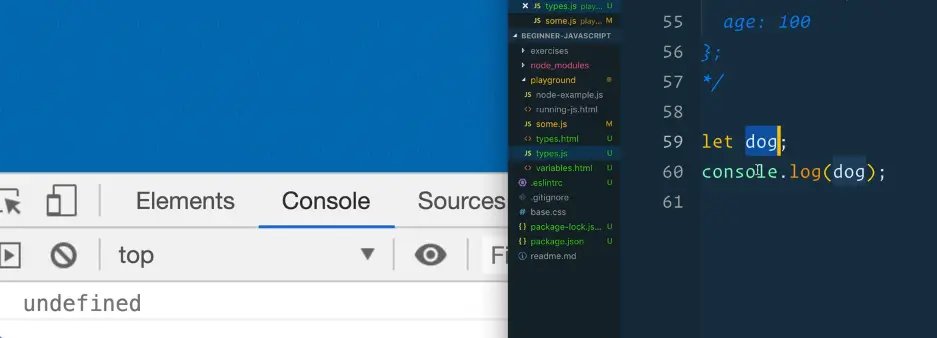Types - Null and Undefined

Enjoy these notes? Want to Slam Dunk JavaScript?
These are notes based on my Beginner JavaScript Video Course. It's a fun, exercise heavy approach to learning Modern JavaScript from scratch.
Use the code BEGINNERJS for an extra $10 off.
There are two ways to sort of express "nothing" in JavaScript, and that is with undefined and null.
undefined
If you create a variable and don't set anything to it, it will be undefined. 👇
let dog;
console.log(dog);

undefined is something that has been created (a variable), but has not yet been defined (given a value).
The same thing goes for properties on an object. If you type in the console person.dog it will return undefined.
Why? Because there is nothing there. That is what undefined is.
It comes about when you try to access a variable that has been created but not given a value.
If you typed in the console wes, you would see an error message returned that said 'wes is not defined' which means that you didn't create a variable called wes.
With the dog example we used above, we have created the variable but we have not set a value. That is the difference.
null
Now we will discuss the null type.
Null is a value of nothing, whereas undefined is a variable that has not yet had a value set to it.
We will go over some examples to demonstrate.
In types.js add the following 👇
let somethingUndefined;
const somethingNull = null;
NOTE: you cannot use a const variable without setting a value.
somethingUndefined is undefined because it does not have a value set, whereas somethingNull has the value of null, which is nothing. They are both nothing, but in different ways.
Let's say for example we have Cher and Teller (both of who are real people), who we will represent in objects like so 👇
const cher = {
first: "Cher",
};
const teller = {
first: "Raymond",
last: "Teller",
};
teller.first = "Teller";
teller.last = null;
In this example, Cher never had a last name, so she does not have the last property in her object.
Teller on the other hand, got rid of his last name, so we are explicitly setting it to null.
In the console, if you type cher.last you will see the value of undefined returned. When you try teller.last, the value of null will be returned.
Find an issue with this post? Think you could clarify, update or add something?
All my posts are available to edit on Github. Any fix, little or small, is appreciated!
